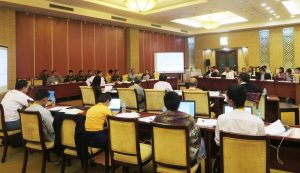Discussions on the five sectors of political, social, economic, security, and land and environment, which will be submitted to the upcoming session of the Union Peace Conference – 21st Century Panglong, have been completed at the Myanmar International Convention Center – 2 in Naypyidaw on June 28.
“After collecting the papers, we discussed about which points can become policies during the first [meeting]. Then, we will approve them during the UPDJC meeting tomorrow (June 29). We will continue to discuss it with the work committee after they have been approved,” said Min Zeyar Oo from the Union Peace Dialogue Joint Committee (UPDJC) secretary group, who attended the Economic Sector Work Committee Meeting.

The six-point paper, which was brought over from the previous session and papers from ethnic armed organizations (EAOs) such as the three Karen armed organizations – the Karen National Union (KNU), the Democratic Karen Benevolent Army (DKBA), the Karen National Union/Karen National Liberation Army – Peace Council (KNU/KNLA-PC) – the Arakan Liberation Party (ALP), and the Chin National Democratic Front (CNF) were included in the discussions, he continued.
“The previous 10th UPDJC meeting sent us six points for re-discussion. We have discussed all the points. Another thing is that there is a 24-point paper submitted by five EAOs. Among them, we have discussed 13 points. We have also discussed half of 71 points submitted by the Mon National Level Political Dialogue and eight points submitted by political parties. The ethnic people have taken these points back to their superiors. We will discuss them again on the coming July 4, 5, and 6. After that, they will be submitted to the Union Peace Conference – 21st Century Panglong via the UPDJC,” said U Hla Maung Shwe, member of the UPDJC secretary group.
The participants discussed the proposals on protecting the right of ethnic minorities, democratic rights, fundamental human rights, gender equality, principles of economic and regional development in a federal system, implementing a market-oriented economic system, ethnic literacy, preserving ethnic language, literature, customs, culture and traditions, national costumes, historical heritages and cultural heritages, implementing an all-inclusive education system and universal healthcare system, and forming a single unified military under a federal democratic country.
The three-day UPDJC Work Committee meeting was divided into five sectors and 15 people participated in the discussion under each sector – four representatives of the government, Hluttaw, and Tatmadaw, four EAO
representatives, four representatives of political parties, and three UPDJC secretaries.

